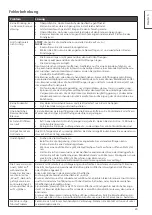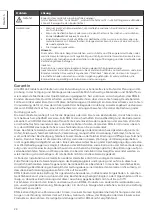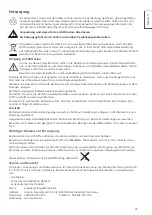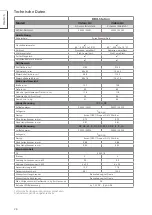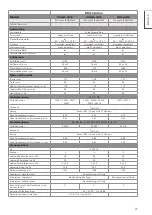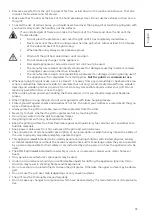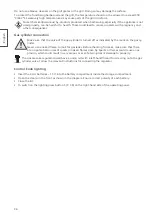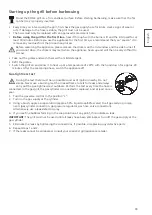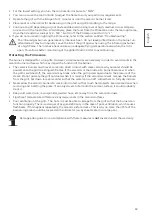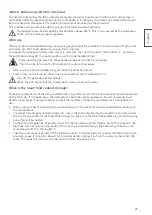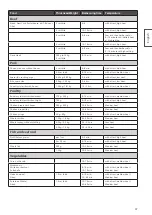
34
English
•
Never use damaged gas cylinders. Dented or rusty gas cylinders or gas cylinders with damaged valves
are potentially dangerous and should be replaced immediately with a fully intact cylinder.
•
The connection for the hose on the gas cylinder must be tested for leaks every time the gas cylinder is
connected to the appliance.
•
Make sure that the gas pressure regulator is attached so that the small vent hole faces downwards and
no water can enter the vent hole. That vent hole must be kept clean and free of dirt, grease, insects,
etc.
Gas-tightnesstest
Carry out the gas-tightness test every time the gas cylinder is connected or replaced and at the start of the
barbecue season.
See description p. 39
Whatispropane/butanegas?
Propane and butane are fuel gases that liquefy when pressurised to a certain degree. Liquefied gas is easily
transportable, e.g. in gas cylinders.
Are all liquefied gases the same?
No. Liquefied petroleum gas, commonly known as LPG, is used in cars. Propane and butane are only used in
household appliances. This instruction manual deals only with propane or butane gas.
How do propane and butane differ from natural gas?
Propane and butane are similar to natural gas. They are all colourless, non-toxic and carbon-neutral when
burned. However, there is one important difference – propane and butane are heavier than air. If the gas
escapes, it does not disperse, but instead collects and forms pools on the ground or in the bottom of your
appliance.
Importantoperatinginstructions
Do not use in enclosed spaces in case poisonous fumes gather that may lead to serious or even fatal
injury.
Only use this grill in the open in a well ventilated place. Do not use the grill in a garage, a building,
walkways/corridors between buildings or any other locations surrounded by building structures.
•
Never use the grill under combustible roofs, shelters, etc.
•
Incorrect assembly can be dangerous. Please follow to the letter the assembly instructions provided. Do
not use this grill until all components have been properly assembled and the gas-tightness test has been
carried out. .
•
Take appropriate care when using the grill. The grill becomes hot when grilling. Never leave the grill
unsupervised when in use.
•
This grill gets very hot and, when in operation, should only be taken hold of with barbecue gloves and
only at the points necessary for operation. When the grill is alight, only hold the grill lid by the handle
provided.
CAUTION! Risk of fire from excess fat!
Before use, check all processes that lead to the fat catcher as well as the fat catcher for accumulated
fat. Remove excess fat to prevent fat fires.
If a fat fire should occur, close the gas supply and keep the lid closed until the fire has been extinguished.
• Never line the cooking compartment with foil or sand. This prevents the fat from passing through and
may cause a fat fire. Instead, you should use drip trays to catch the juices running out of the meat.




